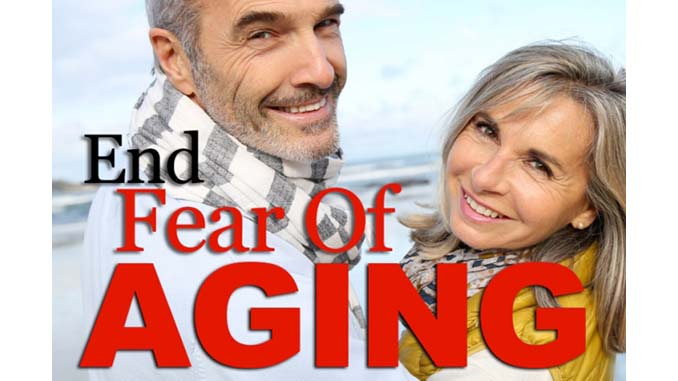
Baby Boomers are Looking to End
The Fear of Aging
Old age for Baby Boomers is like the weather:
We talk about aging, but we don’t do anything about it.
Oh, we’ve tried.
For millennia, charlatans have been offering remedies for aging that didn’t work any better than baldness cures and virility restorers.
Now, however, with baldness cures and virility restorers that do work found as close as the nearest drugstore, researchers have started looking into ways to slow, stop or perhaps even reverse the changes that accompany aging.
If these scientists succeed, their breakthroughs may lead to major changes in human society.
We’ve long regarded aging as something almost mystical or supernatural, and it’s easy to see why. Unlike, say, smallpox, aging doesn’t come on suddenly or spread from person to person. You also don’t recover from it, as you do from most infectious diseases. It happens gradually, and it’s pretty much unrelenting. Eyesight dims, joints get stiff and achy, teeth go bad, and, in general, things just keep getting worse until death arrives.
But research demonstrates that aging isn’t a supernatural process; it’s a physical one that gradually occurs as systems wear out beyond the body’s ability to repair them. Cells fill up with metabolic debris called lipofuscin that they can’t digest, accompanied by decreasing functionality. They also undergo glycation, gumming up and caramelizing with sugars that have bonded to proteins. Mitochondrial DNA can suffer mutations, and the body slowly loses stem cells, which weakens healing and repair.
Aging is break-down, but broken things can be fixed. After all, cars and airplanes tend to wear out as they get older, but with sufficient maintenance, they can last far beyond their design life.
Biogerontologists believe that living longer is a fairly straightforward engineering problem:
Find out what breaks and fix it. De Grey promotes an approach he calls Strategies for Engineered Negligible Senescence or SENS. It identifies seven specific breakdowns and attempts to attack each of them in turn. He and others are researching longevity with support from nonprofits and an X Prize approach aimed at extending the lifespan of mice. (Researchers call it the Mprize, a reference to their quest to engineer the “Methuselah mouse.”) I certainly wish them well — after all, I’m not getting any younger — but de Grey says that it will probably be 20 or 30 years before we see effective antiaging drugs on the market.
Scientists have already identified more modest life extenders. It’s pretty thoroughly established that red wine’s resveratrol activates the SIRT-1 gene, which seems to clean out the intracellular gunk. (The gene is also triggered by calorie restriction.) Studies show that rats dosed with resveratrol — or given low-calorie diets — seem to live longer and remain far more vital than ordinary rats. Sirtris Pharmaceuticals is currently conducting human testing of a drug called SRT501 as a treatment for diabetes, but it may also hold promise for retarding the aging process and alleviating a number of inflammatory diseases that go with getting older.
At Stanford, researchers have reversed the aging of skin in mice, making it look and act like young skin, which contains cells that reproduce rapidly. This treatment isn’t ready for humans, but it suggests an approach. And given the popularity of cosmetics that merely address the appearance of aging, it seems likely a product that produces new skin would sell like hotcakes.
Meanwhile, commercial resveratrol supplements are available, and people are taking them, including some scientists in the field. As part of the research for this column, I started taking one.
On the flip side, people often see extended longevity as dubious, envisioning extra years in the nursing home. As Jay Leno says, “People tell you to eat right and exercise, but that only gives you more years in your 80s. Who needs that? What I really want are more years in my 20s.” New treatments for aging would give us just that — or at least healthier years in our 60s and 70s. The goal isn’t just more years in your life, but more life in your years.
If antiaging drugs eventually work, who could be against them? Well, Dr. Leon Kass, for one. Kass, former chairman of the President’s Council on Bioethics, writes: “Is it true that longer life for individuals is an unqualified good? If the human life span were increased even by only 20 years, would the pleasures of life increase proportionately?”
The obvious answer: It depends on the individual. But on a societal level, the extension of people’s productive working lives could pay huge dividends. If people stay youthful longer, we’ll see less pressure on the stressed-out social security systems of most industrialized countries. If 65-year-olds were as vigorous as 35-year-olds, or even 45-year-olds, there would be no reason to fund their retirement. Pushing the retirement age back a decade or two could save trillions. And, of course, if you can reverse aging, the whole notion of retirement becomes obsolete.
CAN WE STOP GETTING OLD – REVERSE AGING? NEW RESEARCH.
The reality is that Americans now live longer, healthier lives for several decades longer than the majority did a century ago. Most of us think it’s a good thing. Would extending this phenomenon by several more decades be good, too? Seems like it to me.
BOOK: Reverse Aging




